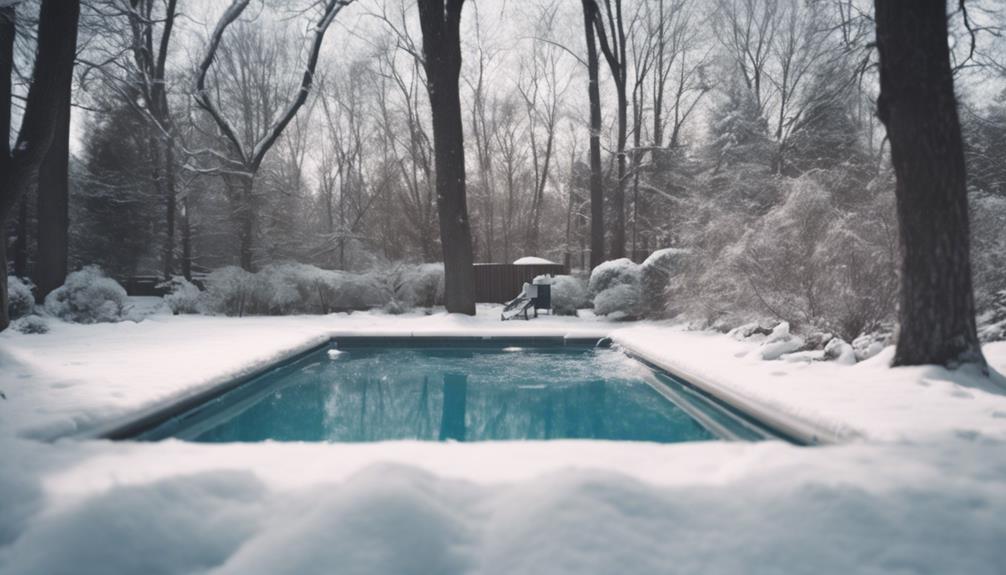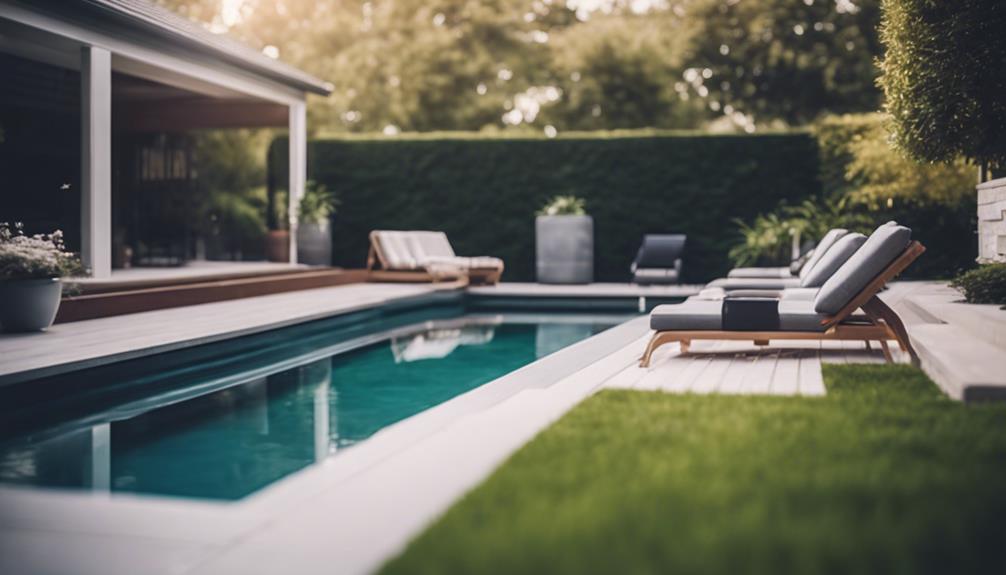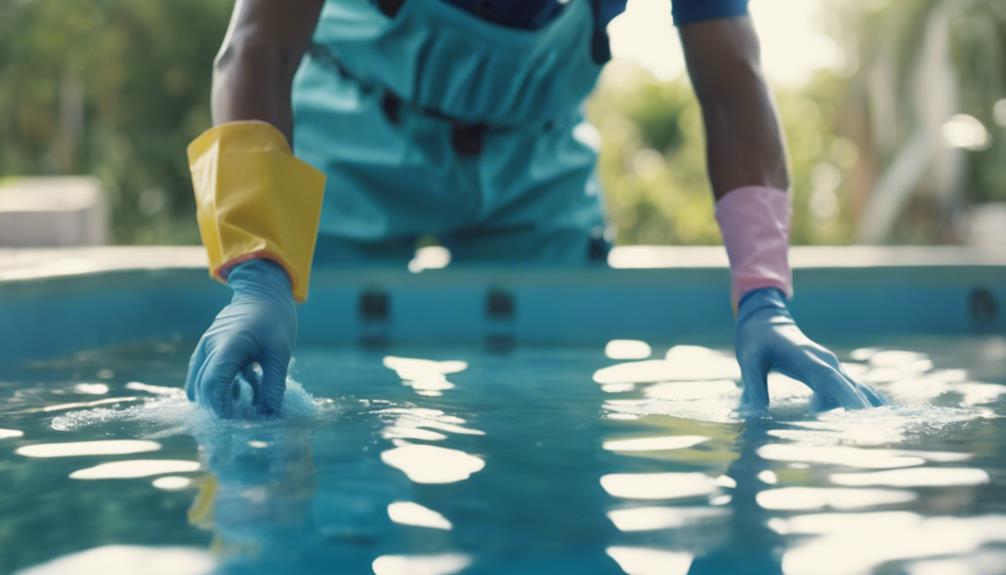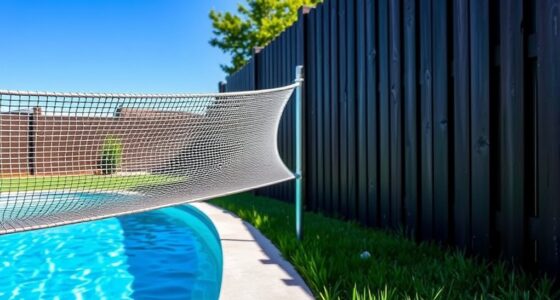Maintain a proper winter pool care routine by shutting off equipment in freezing temperatures, adjusting water levels, and regularly balancing chemicals. Invest in a quality pool cover to keep debris out and prevent slipping. Be mindful of draining water to protect the pool's structure and increase its lifespan. Test and maintain chemical levels consistently to avoid imbalances. Prevent frozen pool pipes by draining water from equipment, turning off power, and checking for leaks. Following these tips will help preserve your pool's condition during the winter months.
Key Takeaways
- Shut off equipment below 30°F to protect it.
- Invest in a quality pool cover for winter.
- Maintain proper chemical levels consistently.
- Drain water to recommended levels to prevent damage.
- Inspect and address frozen pool pipes promptly.
Winter Pool Closing Guidelines
When preparing to close your pool for the winter season, it is essential to follow specific guidelines to secure proper maintenance and protection of your pool equipment. Start by shutting off pool equipment when the overnight temperature drops to 30°F or lower to prevent damage.
Follow manufacturer guidelines for caring for submerged products during winter to secure longevity. Adjust the water level by draining it to 4-6 inches below the pool skimmer to prevent freezing and damage to the pool structure.
Regularly test and balance chemical levels to protect the pool during winter and avoid costly repairs. By adhering to these guidelines, you can secure that your pool remains in top condition throughout the winter season.
Effective Pool Covering Techniques
Ensuring a proper fit and secure placement, a quality pool cover is essential for effectively safeguarding your pool during the winter season. A well-fitted cover prevents debris, rainwater, snow, and ice from entering the pool, reducing the maintenance needed during the off-season. Opt for an automatic cover for added convenience, ensuring it fits tightly over the pool to prevent slipping. Secure the cover using lawn anchors or water bags to keep it in place. Regularly cleaning off the cover helps in easing the pool reopening process.
| Pool Covering Techniques |
|---|
| Invest in a quality pool cover |
| Opt for an automatic cover |
| Ensure tight fit to prevent slipping |
| Use lawn anchors or water bags for security |
| Regularly clean off debris |
Proper Pool Water Draining Methods
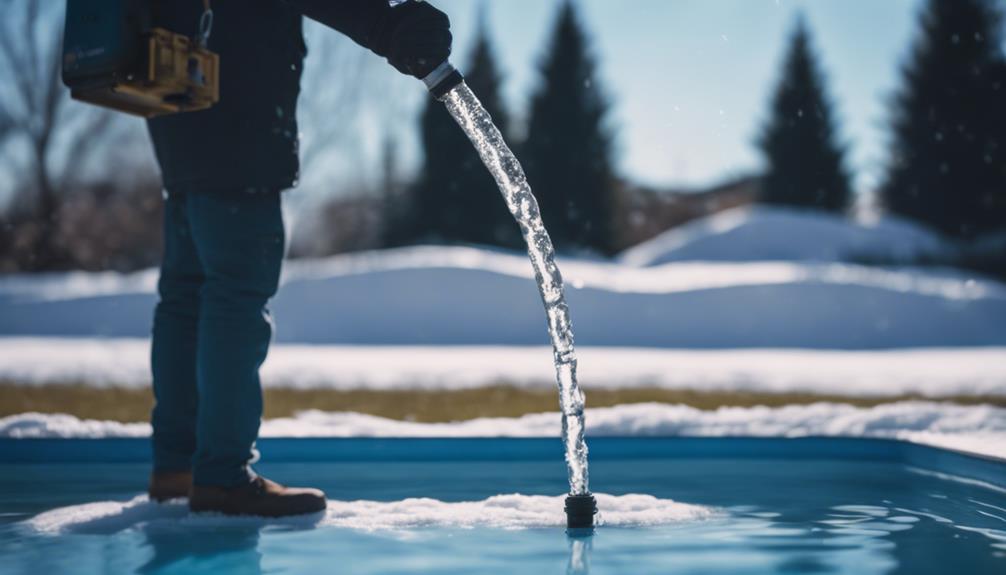
An essential aspect of winter pool maintenance involves implementing proper methods for draining pool water to safeguard the pool structure during the colder months. Draining the pool water to a level 4-6 inches below the pool skimmer is vital to prevent damage to the tile or plaster finish caused by freezing water.
Proper adjustment of the water level based on climate conditions is important to avoid costly repairs. Maintaining the appropriate water level helps protect the pool structure throughout the winter season. Ensuring the correct water drainage is in place will contribute significantly to prolonging the lifespan of the pool and minimizing potential damage.
Essential Chemical Level Maintenance
Proper maintenance of essential chemical levels is important for preserving the integrity of a pool during the winter season. Regular testing and balancing of pH and chlorine levels are necessary to guarantee the water remains clear and safe for swimming when the pool reopens. Addressing any chemical imbalances promptly can prevent issues like cloudy water or algae growth. By monitoring and maintaining proper chemical levels, costly repairs or treatments can be avoided. Below is a table summarizing key points for maintaining essential chemical levels effectively:
| Essential Chemical Level Maintenance |
|---|
| – Test water weekly for pH and chlorine levels |
| – Maintain proper chemical balance |
| – Address imbalances promptly |
| – Keep chlorine levels steady |
| – Monitor chemical levels consistently |
Preventing Frozen Pool Pipes
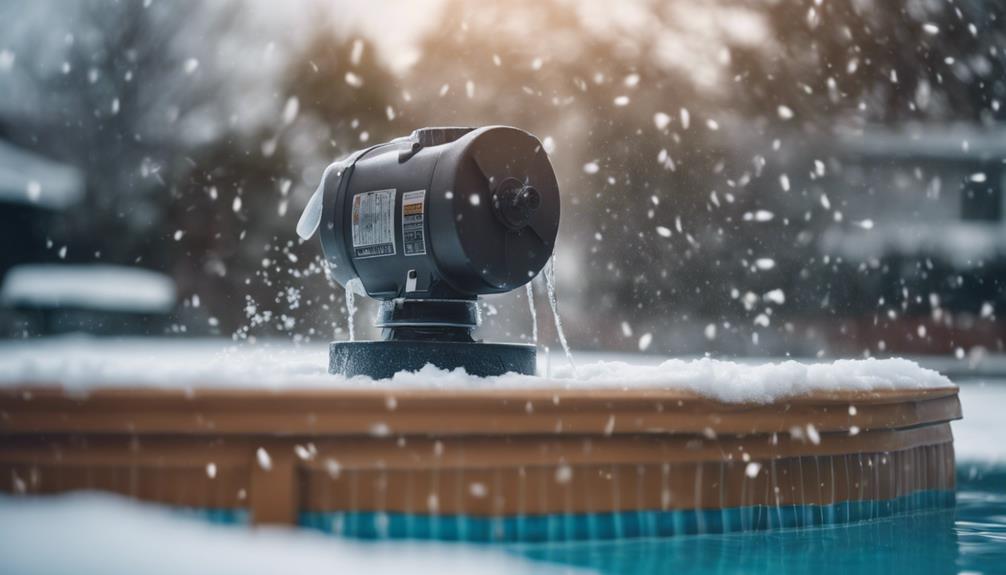
To prevent damage to pool equipment during winter, it is essential to drain water from the pump, heater, and filter to avoid frozen pool pipes. Water left in these components can freeze, expand, and cause cracks or other damage.
Start by turning off the equipment and disconnecting any power source. Remove drain plugs and open valves to allow any remaining water to flow out. Additionally, inspect the pipes for any visible cracks or leaks that may need repair before winter sets in.
Frequently Asked Questions
Can I Use a Regular Tarp or Plastic Sheet as a Pool Cover?
While a regular tarp or plastic sheet may cover a pool, it's not ideal for winter protection. Opt for a quality pool cover designed for the task. This investment guarantees proper protection from debris, snow, and ice, safeguarding your pool during the colder months.
How Often Should I Check the Pool Cover During Winter?
Regularly inspecting the pool cover during winter is essential. Check for debris accumulation, cover slippage, or tears. Aim to examine the cover at least once a week to make sure it remains secure and effectively protects the pool.
Is It Necessary to Add Algaecide to the Pool Before Closing?
Adding algaecide before closing the pool can provide an extra layer of protection against algae growth during winter. While not always necessary, it can prevent potential issues, ensuring a cleaner and easier pool reopening process.
Should I Remove the Pool Ladder Before Covering the Pool?
Removing the pool ladder before covering is recommended for safety reasons. It prevents accidents and damage to the ladder during winter. Store the ladder in a dry place to maintain its condition and prolong its lifespan.
Can I Use a Leaf Blower to Remove Debris From the Pool Cover?
Yes, you can use a leaf blower to remove debris from the pool cover. Confirm the blower is set to a low setting to prevent damage. Regularly clearing debris off the cover helps maintain its integrity and makes pool reopening easier.
Conclusion
To wrap up, proper winter care for your pool is essential to guarantee its longevity and functionality.
Did you know that as per the Association of Pool & Spa Professionals, the average lifespan of a well-maintained pool is about 15-20 years?
By adhering to the winterizing tips detailed in this article, pool owners can safeguard their investment and relish their pool for many years to come.
Remember to remain attentive and proactive in maintaining your pool during the colder months.

